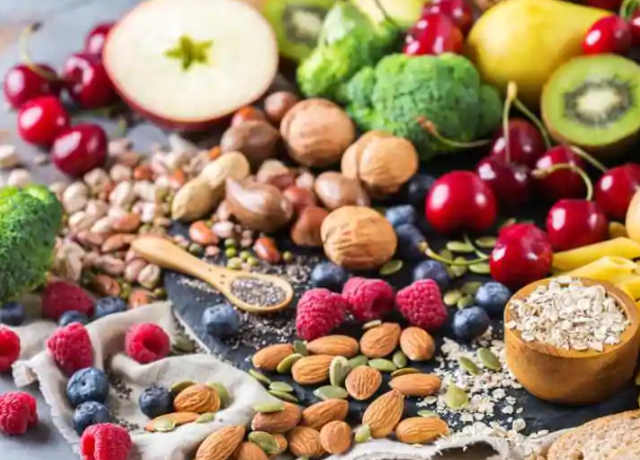Metabolism is the rate at which the body burns calories and carries out other processes. The higher your metabolism, the more calories you burn and the easier it is to maintain your weight or get rid of unwanted body fat. There are certain foods contain specific nutrients that increase the body’s metabolism.
Following are 10 of the best metabolism boosting foods, along with some other ways to increase metabolic function:
1. Eggs
Protein-rich foods are amongst the best options for boosting metabolism. Eggs are rich in protein, with each large, hard-boiled egg containing 6.29 grams (g), making them an ideal choice for people who want to speed up their metabolism.
Protein is one of the most effective nutrients for increasing metabolic rate because the body needs to use more energy to digest it than it does for fats or carbohydrates. Scientists call this energy expenditure the thermic effect of food (TEF), or diet-induced thermogenesis (DIT).
2. Coffee
Studies report that the caffeine found in coffee can help increase metabolic rate by up to 11%. In fact, six different studies found that people who consume at least 270 mg of caffeine daily, or the equivalent of about three cups of coffee, burn an extra 100 calories per day.
Furthermore, caffeine may also help your body burn fat for energy and seems especially effective at boosting your workout performance. However, its effects seem to vary from person to person, based on individual characteristics such as body weight and age.
3. Flaxseeds
Flaxseeds are seeds that contain protein, vitamins, and other key nutrients. Some people consider flaxseeds a “functional food,” which means that people eat them for their health benefits. Eating flaxseeds could help boost metabolism and improve metabolic syndrome, which is a group of conditions that contribute to diabetes, obesity, and cardiovascular disease.
Flaxseeds boost metabolic rate, because they contain good amounts of fiber and protein, along with essential omega-3 fats, antioxidants, and other essential nutrients.
The fiber in flaxseeds ferments in the gut to improve the gut’s bacterial profile. This process aids metabolic health, and it may protect against obesity.
4. Tea

According to research, the combination of caffeine and catechins that’s found in tea may work to boost your metabolism. In particular, both oolong and green tea may increase metabolism by 4–10%. This could add up to burning an extra 100 calories per day.
In addition, oolong and green teas may help your body use stored fat for energy more effectively, increasing your fat-burning ability by up to 17%. Nevertheless, as is the case with coffee, effects may vary from person to person.
5. Lentils
Lentils are another functional food that may reduce the effects of metabolic syndrome. Eating lentils and other legumes, such as beans and peas, can play a central role in preventing and treating metabolic syndrome.
Lentils may also increase metabolism because they are rich in protein. They also contain good amounts of fiber to feed beneficial bacteria in the gut.
6. Cacao
Cacao and cocoa are tasty treats that may also benefit your metabolism. Cocoa and cocoa extracts may promote the expression of genes that stimulate the use of fat for energy. Interestingly, one study suggests that cocoa may prevent the action of enzymes necessary to break down fat and carbs during digestion.
In doing so, cocoa could theoretically play a role in preventing weight gain by reducing the absorption of some calories. However, some studies examining the effects of cocoa, cacao or cacao products such as dark chocolate are rare. More studies are needed before strong conclusions can be made. If you’d like to give cacao a try, opt for raw versions, as processing tends to reduce the amounts of beneficial compounds.
7. Chili peppers
Spicy meals that contain fresh or dried chili peppers can increase metabolism and a feeling of fullness. A compound in peppers, called capsaicin, is responsible for these health benefits and more.
The researches also suggests that the compound can contribute to weight management in other ways by increasing the speed at which the body burns fat and reducing appetite. Capsaicin may also reduce pain and inflammation, act as an anticancer agent, and provide antioxidant benefits. As a result, some researchers suggest that the compound may help treat conditions such as rheumatoid arthritis and Alzheimer’s disease.
8. Apple Cider Vinegar

Apple cider vinegar may increase your metabolism. Apple cider vinegar is often claimed to boost metabolism in humans, but few studies have investigated the matter directly.
Nevertheless, apple cider vinegar may still help you lose weight in other ways, such as slowing stomach emptying and enhancing feelings of fullness.
One study in humans even showed that participants given four teaspoons (20 ml) of apple cider vinegar ate up to 275 fewer calories over the rest of the day. If you’d like to give apple cider vinegar a try, be careful to limit your daily consumption to two tablespoons (30 ml).
9. Ginger
Adding ginger to meals could increase body temperature and metabolic rate, and help control appetite.
Studies evaluated ginger’s effects on weight loss and metabolic profiles in people who were overweight. It found that the spice may help to reduce body weight and fasting glucose levels while increasing high-density lipoprotein (HDL), or “good” cholesterol.
Ginger also has anti-inflammatory properties, and it may help to reduce nausea during pregnancy and after chemotherapy treatment.
10. Coconut Oil
Coconut oil is experiencing a surge in popularity. That may be partly because coconut oil is high in medium-chain triglycerides (MCTs). This is contrary to most other types of fats, which usually contain higher amounts of long-chain fatty acids.
Unlike long-chain fats, once MCTs are absorbed, they go directly to the liver to be turned into energy. This makes them less likely to be stored as fat.
Interestingly, several studies show that MCTs can increase metabolic rate more than longer-chain fats. In addition, researchers report that a daily intake of 30 ml of coconut oil may successfully reduce waist size in obese individuals.





